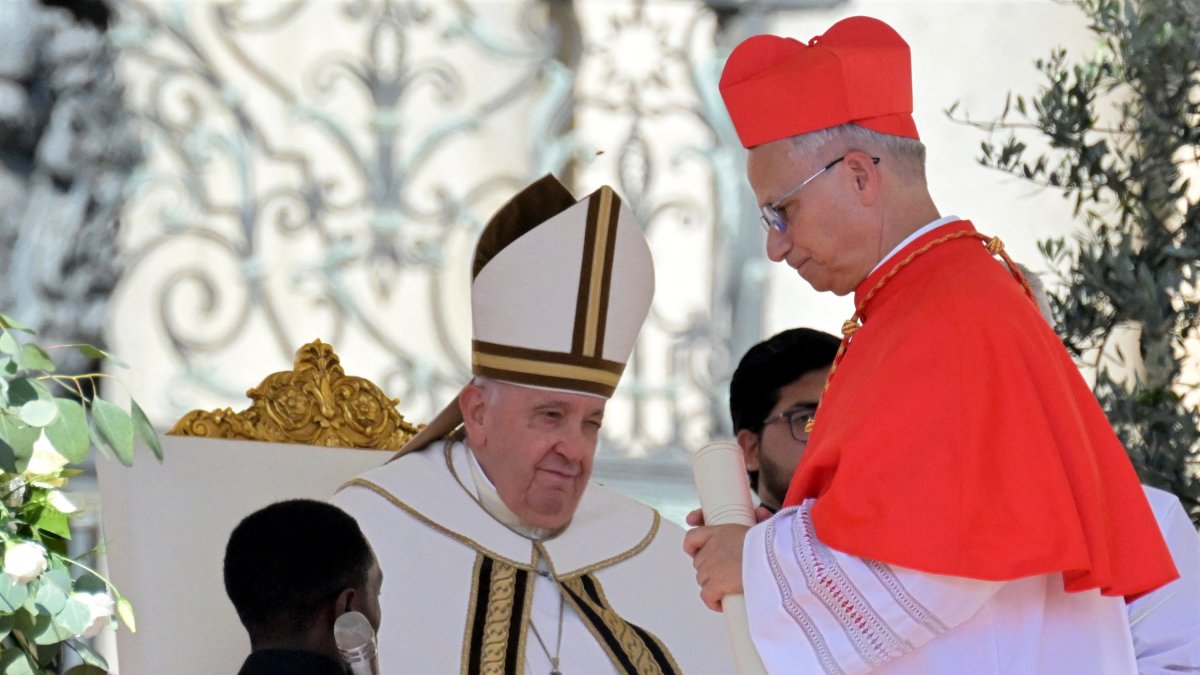ANALYSIS.
Why Leo XIV?
The choice of name is one of the keys to what will be the pontificate of a new pope. Robert Prevost, for his part, has opted for that of the father of the Social Doctrine of the Church and of the man who stopped Attila bare-handed at the gates of Rome.

Pope Francis makes Robert Prevost, now Leo XIV, a cardinal.
If Jorge Bergoglio became the first pope to take the name Francis for the saint of Assisi and create "a poor Church and for the poor," Robert Prevost has opted for Leo, much more common among Peter's successors, but with a clear and forceful message. The last pontiff to bear that name was the father of the Social Doctrine of the Church, more than 130 years ago, and the first to take it is remembered as the man who prevented with his word what the strength of the Roman legions failed to do: prevent Atila from destroying the Eternal City.
Born Gioacchino Vincenzo Raffaele Luigi Pecci in Carpineto (Italy) in 1810 and died in Rome in 1903, he was elected Supreme Pontiff in 1878. As a child of an era marked by the Industrial Revolution and the rise of syndicalism, Leo XIII became a strong defender of the working class against abuses, but also against the dangers of theories such as socialism, which he described as illusory and synonymous with hatred and atheism.
‘Rerum Novarum’ 130 years of Social Doctrine of the Church
The author of Rerum Novarum revolutionized the world during the twenty-five years of his pontificate, between 1878 and 1903. His well-known encyclical, published in 1891 laid the foundations of the Social Doctrine of the Church and was an earthquake in the Catholic and non-Catholic world.
The Salesian journalist Mateo González notes in the specialized magazine Vida Nueva: "The encyclical was the magna carta of the social proposal for the world on the part of Christians. Now, Prevost comes to disarm the fallacies of a world that has not yet welcomed the message of encounter and peace of Francis, of Jesus. Leo XIII was the first pontiff to condemn a group of rich people (few) who accumulated all the goods; now someone coming from Chicago and the Peruvian jungle will have to actualize Jesus' proposal for a polarized and divided world."
As a curiosity, like Francis, he did not want his body to rest in the Vatican. Although 21 years had to pass after his death, in 1924 his remains were transferred to the Basilica of St. John Lateran, following his wishes.
St. Leo the Great, savior of Rome before Attila, fighter for unity and scourge of heresies
With Prevost, there are 14 popes who have used the name Leo to date. The first of them is also one of the most prominent pontiffs of the Church. Known as St. Leo the Great, from the 5th century, he became a symbol of strength, doctrinal authority and leadership in difficult times, being remembered by history as the man who stopped Attila at the gates of Rome, as well as being forced to fight against heresies. Another forceful example that Prevost takes as a reference.
In this sense, and with a clear message for the current situation of the Church, Leo I was a strong advocate of the unity of the Church. In this sense he was crucial at the Council of Chalcedon. For St. Leo the Great, the search for unity is essential for building strong relationships and overcoming challenges.
In addition, St. Leo the Great stressed the importance of servant leadership. For him, a leader must be a servant, in imitation of Christ, the Good Shepherd, who gave his life for the sheep and redeemed humanity. Leo I was also a firm defender of the Incarnation, holding that, God became true man, highlighting God's closeness to humanity and redemption through Christ.

























